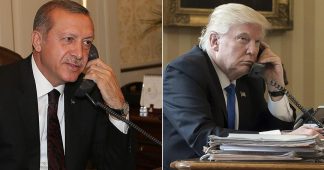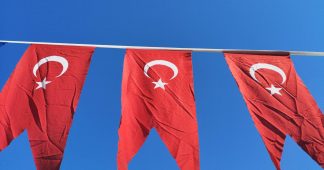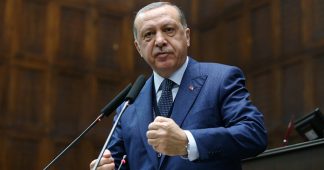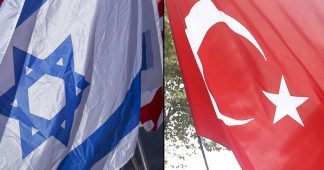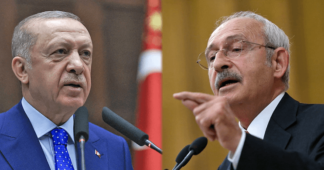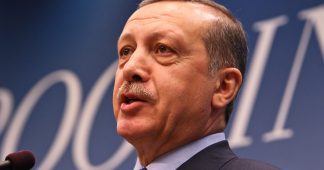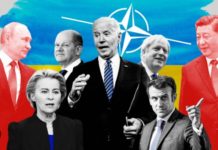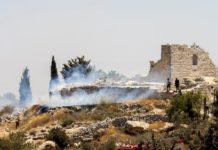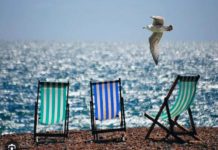Abdullah Bozkurt
May 14, 2023
No matter the results of Turkey’s presidential and parliamentary elections, nefarious, anti-democratic and unaccountable factions entrenched in Turkish institutions and society with considerable political influence will not fade away, providing little hope for a better prospect for Turkey and a solid, stable and sustainable path for building a real democracy.
Unless Turks really address this fundamental problem in their midst, we will continue to see something of a game of musical chairs in Turkish politics. A vicious cycle between reforms and rollbacks of democratization will be inevitable unless these dark forces lurking in the shadows and sometimes rearing their ugly heads are restrained and put under control.
One thing is certain, though. Whether Turkish President Recep Tayyip Erdogan and his Public Alliance (Cumhur İttifakı) of far-right, Islamist and neo-nationalists win, or the opposition Nation Alliance (Millet İttifakı) led by Kemal Kılıçdaroğlu wins, both have no choice but to make adjustments in domestic and foreign policies in order to sustain their governments. Both would be desperate to mend fences with the West, from which Turkey obtains the bulk of its investment and does most of its foreign trade. The pressure on Turkish society, which has become extreme, needs to be relieved, and any future government will have to proceed in a manner that neither causes a rupture in the society nor sparks irreconcilable conflict.
However, most of the decisions the next government will take out of necessity would be predicated on tactical moves rather than a strategic realignment and a firm commitment to the rule of law, democracy and fundamental rights. If Erdogan wins, he would brand his U-turns as normalization. If Kılıçdaroğlu wins, he would try to sell his government policies as a restoration of democracy and a return to the rule of the law. But given the fact that both are authoritarian leaders in their own political parties with little or no intra-party democracy, neither is really interested in seeing a full-fledged democracy with checks and balances, independent institutions and an impartial media. In any case, the nefarious factions nested in the country’s institutions will continue to exert influence, undermining any progress and dealing blows to policy adjustments.
There’s no need to go into detail on the Erdogan camp since it’s self-explanatory from the track record of policy actions it has taken during its two decades in power. The opposition bloc, however, requires closer scrutiny as it hasn’t yet been tested in a coalition government, although some opposition leaders in the bloc have been in government, such as Ahmet Davutoğlu, a former prime minister, and Ali Babacan, a former economy czar. Both had helped Erdogan dismantle government institutions, undermine the rule of law, adopt aggressive positions in foreign policy and vigorously defend the cracking down on critics and dissidents when they were in power.
Three out of the six official partners in the opposition bloc –- the Saadet (Felicity) Party, Gelecek (Future) Party and Democracy and Progress Party (Demokrasi ve Atılım Partisi or Deva) — are rooted in political Islam, and their leaders are deeply committed to this ideology. This is a huge concern. Erdogan comes from the same background, and he had filled most government positions with people from Saadet as part of his politicized Islamization project for years. The main reason Saadet leadership dislikes Erdogan personally is because of lingering feelings of betrayal when Erdogan parted ways with the late Necmettin Erbakan, the founder of political Islam in Turkey and chairman of Saadet in the early 2000s. On most issues, Saadat mirrors the Erdogan government’s policy choices and hopes to impose political Islam, similar to the divisive and exclusionary Muslim Brotherhood ideology, on Turkey.
As for Davutoğlu with his delusional mindset of neo-Ottomanism, he was a key engineer of most of the troubles in Turkey’s foreign policy when he served in various positions, first as a chief advisor to Erdogan on foreign policy, then as foreign minister and finally as prime minister. Turkey’s entanglement in the Syrian quagmire is one of his terrible legacies. When he was prime minister, his government seized Ipek, the third largest media outlet in the country, in October 2015; Kaynak Holding, the largest publishing house, in September 2015; and Zaman, the most highly circulated newspaper, in March 2016 on fabricated charges even though the constitution specifically bars such seizures. He personally ordered the destruction of cities and towns in Kurdish provinces in the name of fighting against the outlawed Kurdistan Workers’ Party (PKK).
Babacan’s track record speaks for itself. He was the economy czar in the Erdogan government and responsible for financial institutions in Turkey when his boss was pocketing billions in bribes and kickbacks. He turned a blind eye when state-lender Halkbank was used by Iranian operative Reza Zarrab to launder Iranian state funds in exchange for bribes given to senior government officials including Erdogan, who was prime minister at the time. He did not act when Zarrab’s secret and unlawful dealings were reported to him in a confidential report by the Turkish intelligence agency MIT months before a corruption investigation pursued by prosecutors was made public in December 2013. He wholeheartedly defended Erdogan in parliament during the ensuing corruption scandal.
The CHP, the biggest player in the opposition bloc, suffers from the encroachment in the party of the neo-nationalists (Ulusalcılık), who are staunchly anti-Israel, anti-Western, anti-NATO and anti-American. Although they brand themselves as secularists, progressives, Kemalists, modernists or Atatürkists, at their core the neo-nationalists within the CHP are actually fascists, far-right nationalists and xenophobes who wield influence over the party’s decisions and policies. That’s why the CHP in the past often supported Erdogan’s policies, especially in overseas military operations that did not really serve the country’s strategic interests.
When the CHP makes comments on problems with Turkey’s allies, neighbors and partners, it often mimics Erdogan’s positions and at times even goes beyond that to promote more of a hawkish line. The tale is told when one reviews remarks made by Kılıçdaroğlu on ties with Greece and and how he would go about resolving outstanding issues in the Aegean and eastern Mediterranean between the two countries. More examples can be found in the speeches of other CHP leaders such as Özgur Özel, the CHP parliamentary group deputy chairman, and Tuncay Özkan, deputy chairman of the CHP, the two leading neo-nationalists who have considerable influence on party policies.
Although the CHP leader adopted a conciliatory tone to appeal to voters on the campaign trail, for both domestic and foreign policy, in sharp contrast to Erdogan’s polarizing stance, it remains to be seen how well he can maintain that position if and when he comes to power. Who can guarantee that he won’t pursue a path similar to that of Erdogan, whose initial terms in office between 2002 and 2010 were marked with a reformist, pro-European Union membership stance before the wolf emerged from sheep’s clothing to roll back all the hard-earned democratic achievements and turn Turkey into one of the worst jailers of journalists in the world.
The second largest partner in the opposition bloc, the Iyi (Good) Party and its far-right nationalist leader Meral Akşener, do not give much hope for moving Turkey to normalcy given the hawkish rhetoric and tone she adopted on the campaign trail, some of which can be ignored since the rhetoric might have been intended for domestic consumption with a view to undermining Erdogan’s far-right ally, the Nationalist Movement Party (MHP). But still, her comments are enough to raise red flags for the future orientation of the country. Kurds still remember her actions when she was briefly interior minister in the 1990s.
Moreover, her team does not exude much confidence, either. She put far-right, organized crime and extremist figures under the party wing, appointed neo-nationalists to key positions, such as Cihat Yaycı, who helped conduct a massive purge of pro-NATO officers from the Turkish military on fabricated charges, and she enlisted the help of Ali Türkşen, a notorious torturer who was indicted and convicted in the past for unlawful activities. Turhan Çömez, her advisor, is a neo-nationalist who has worked with anti-NATO generals, was indicted for conspiracy in 2008 and fled Turkey.
The sixth partner, the center-right Democrat Party (DP), is a small fish in a big pond, but its chairman, Gültekin Uysal, closely trails the the far-right nationalists on the political spectrum. Uysal has never been in government, and his remarks often reflect a nationalist tone.
Last but not least, the pro-Kurdish Peoples’ Democratic Party’s (HDP) and its rebranded version the Green Left Party (YSP), support the opposition against Erdogan even though they are not officially in the opposition bloc. The party has so far failed to totally sever its links to the outlawed PKK, which is listed as a terrorist organization by Turkey and much of the international community. PKK commanders exert significant influence on party politics. Compounding matters further, some of the PKK leaders as well as senior HDP officials have secretly been cooperating with Turkish intelligence agency MIT for years and at times have acted to further the Turkish state agenda at the expense of Kurdish rights and freedoms.
It remains to be seen how the HDP the and YSP would manage to free themselves from the grip of the PKK and dump the MIT assets in their midst. On foreign policy, the HDP’s position also presents challenges for Turkey. For example, the HDP was the only party in parliament that opposed the approval of Finland’s NATO membership during deliberations in the Foreign Affairs Committee and failed to vote for it in the General Assembly.
One may argue that Turkish politicians are pragmatic, that they may not necessarily act the way they did in the past and are quick to make U-turns if that serves their interests. That may be a valid point. Yet here the critical question on the future governance of Turkey still remains to be answered. That is, the opposition bloc has not really clarified how they would manage human resources in the government and how they would actually staff positions in the intelligence, foreign affairs, judiciary, police, military and other institutions.
Erdogan has undermined government institutions through nepotism and by carrying out an unprecedented purge of nearly 150,000 people, many veteran officials, from the government since he was incriminated in graft probes in December 2013. He staffed the vacancies with cronies, loyalists and partisans, with total disregard of their merits and credentials. The opposition parties appear to have plans in place to appoint their own candidates to the most senior positions – part of a power-sharing agreement at the political level – in the government, but they fail to address staffing at the technocratic and bureaucratic levels, which are the backbone of the government machinery. Without that, you cannot actually execute government polices and implement decisions. No one in the opposition has enough human resources with the required qualifications to fill the positions after the removal from key posts of the partisans and loyalists installed by Erdogan and his allies.
The only existing human resource pool that is ready and capable of running the government machinery comprises those who were unlawfully purged and in many cases imprisoned. No clear-cut policy has been expressed so far by any opposition leader to tap this huge potential, prompting concerns that they may be tempted to fill government jobs with their own loyalists and partisans as well. If that happens, we will only see more of the same in Turkey in the post-Erdogan era.
There is also the risk of a paralyzed government under the opposition bloc, which is quite diverse with different goals and ambitions. Each party individually has its own political merits, but they may not mesh in practice when they come to power. Once the common enemy, Erdogan, is out of the picture, what guarantees do we have that these partners will not turn against each other in disputes over power sharing? Who would be the arbiter in the case of conflicts and confrontations? Intra-pary clashes, coupled with inner-party factional disputes, and petty political bickering may very well waste the energy and precious time Turkey has to make up for the time lost during Erdogan’s 21-year-long rule.
That’s why Turkey needs both internal and external anchors to make adjustments in politics in case the ruling elites find themselves in disarray and in clashes with each other, or another authoritarian leader emerges. On the domestic front strong, vibrant and diverse civil society institutions that are not dependent on the ruling elites must be rebuilt along with an independent and critical media that will act as a check on the government and inform the public with fact-based truths. We all know that the so-called opposition media in Turkey in its current form is either acting as a propaganda tool for the opposition or discreetly promoting Erdogan. Real journalists are either behind bars or in living exile. That needs to be changed.
Education policies need to be overhauled as well. For decades, going back to even pre-Erdogan eras, young minds in Turkey were poisoned with nationalistic themes and xenophobic concepts. This took a turn for the worse under Erdogan with the introduction of political Islam in textbooks. Academia and higher education have never been immune from these problems. No concrete proposal has been offered by the coalition to address and rectify this lingering problem so far. They have only talked about bringing more teachers into public education to lure voters and job seekers who are dissatisfied with Erdogan.
Perhaps at this juncture, external actors become vital for Turkey in the post-Erdogan era. I suspect internal dynamics will not be enough to put Turkey back on track. A re-energized EU membership process, closer coordination with European institutions such as the Council of Europe and Organization for Security and Cooperation in Europe (OSCE) and strengthened ties with transatlantic partners, especially in NATO, are a must for the viability and sustainability of Turkey’s democracy.
If these fundamental issues are not resolved, the house of nefarious factions in the opposition bloc will eventually take over, dominate the decision-making process and steer government policies that would pose a threat to stability in Turkey, bring new challenges for NATO allies and lead to the threatening of Turkey’s neighbors once again. Solid anchors ought to be well in place until Turkey’s new rulers start feeling confident enough to breathe on their own after a period of cozying up to allies and partners in order to benefit from diplomatic support, international legitimacy and a financial lifeline in terms of trade, investment and commerce. Otherwise, the house of dark factions will win over rights and freedoms again, undermine the country’s fledgling democracy and pave the way for disengaging from its allies.
We remind our readers that publication of articles on our site does not mean that we agree with what is written. Our policy is to publish anything which we consider of interest, so as to assist our readers in forming their opinions. Sometimes we even publish articles with which we totally disagree, since we believe it is important for our readers to be informed on as wide a spectrum of views as possible.
